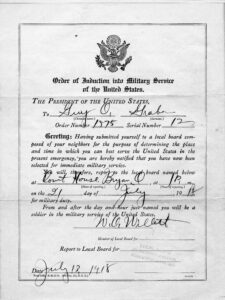When sorting through a donation to the MC USA Archives last summer, Olivia Krall came across the story of WWI conscientious objector Guy O. Graber. She shares some of her findings here.

Olivia Krall is the archives coordinator for MC USA. She strives to use the powerful history of the church to engage and inspire people. She graduated from Goshen College in 2023, with a Bachelor of Arts in history. Prior to joining the MC USA Executive Board staff, Olivia worked at the Elkhart County (Indiana) Historical Museum. Olivia grew up attending First Mennonite Church, Indianapolis, Indiana, a congregation within the Indiana-Michigan Mennonite Conference. She is currently looking for a church home in Elkhart, and has been attending Southside Fellowship, a congregation within the Central District Conference.
___________________________________________
“May we keep on praying that we may be steadfast in our faith with these trials we have to meet each day.”
This line was written by Guy O. Graber in 1918, at Camp Sherman, in Chillicothe, Ohio, just after his conscription into service for World War I. I stumbled upon this sentence as I was cataloging Graber’s papers, which arrived at the Mennonite Church USA Archives last summer through a donation from his granddaughter. The emotion behind his words has stuck with me.

Guy O. Graber’s World War I draft notice. Photo courtesy of the MC USA Archives.
Graber’s letters, journals and official documents detail the perils of being a conscientious objector (CO) in World War I, from the day of his conscription and arrival at the Bryan County (Ohio) Court House to his time at Camp Sherman and the end of his farm furlough in 1919. A CO is someone who refuses to fight, based on moral or religious grounds. During World War I, COs were assigned to non-combatant roles, such working on farms, providing medical aid or driving field ambulances.
Despite the harsh realities of nonresistance, Graber remained steadfast in his faith. His journal depicts his refusal to wear a military uniform and the consequent intimidation he faced to change his beliefs. It was only after an array of officers, including colonels, sergeants and a captain, failed to coerce Graber into military service that they finally transferred him to a CO unit.
His letters also show the challenges his peers faced. A letter from Sept. 3, 1918, describes fellow COs getting sent away. Graber writes, “It’s to God for those boys that have to leave again. They certainly have my sympathy.” Another letter written to Graber from a friend pleads for help to find a farm on which to serve his furlough, to protect himself from the “patriotic sentiment that is so against the Mennonite people” near his camp.
Graber’s longing for the war to end permeates his collection.
In one letter, he writes, “I don’t believe an hour passes that I don’t think of home.”
Collections such as these make our Archives unique and valuable. Graber’s letters and journals and similar unpublished works give us a window into how people understood their lives and how they responded to the challenges that defined their generations.
“But this life is only a vapor and soon passeth away. So let us live a life that when we die, we can live in that Home above which is shepherded for all those that love Him.” – Guy Graber, Sept. 29, 1918
Citation:
Guy O. Graber Papers, 1893-1960. HM1-1051SC. Mennonite Church USA Archives – Elkhart. Elkhart, Indiana.
 Do you want to read more stories like this? Read the Archives News, the new quarterly newsletter from the MC USA Archives, here.
Do you want to read more stories like this? Read the Archives News, the new quarterly newsletter from the MC USA Archives, here.
The MC USA Archives seeks to inspire people worldwide to follow Jesus Christ by engaging them with the historical record of Mennonite Christian discipleship. Help the Archives continue to share stories like this one by donating here.

